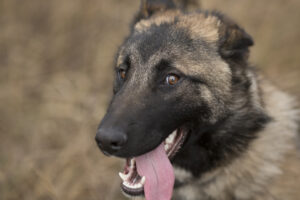

Common respiratory problems in dogs can stem from a variety of causes, including infections, allergies, and anatomical abnormalities. Recognising the symptoms early and understanding the potential causes can help ensure your dog receives timely treatment and care.
Symptoms of Respiratory Problems in Dogs
Watch for these common signs that may indicate a respiratory issue:
- Persistent coughing or gagging
- Wheezing or difficulty breathing
- Nasal discharge or congestion
- Frequent sneezing
- Rapid or laboured breathing
- Loss of appetite
- Lethargy or general weakness
- Intolerance to exercise or physical activity
Common Respiratory Issues in Dogs and Their Treatments
1. Kennel Cough
Kennel cough is a highly contagious respiratory disease caused by a combination of viruses and bacteria. Treatment options include:
- Antibiotics for bacterial infections
- Cough suppressants to ease symptoms
- Supportive care such as rest and hydration
Prevention: Vaccination is an effective way to protect against kennel cough.
2. Canine Influenza
This viral infection causes fever, coughing, and nasal discharge. Treatment involves:
- Supportive care, including fluids and rest
- Anti-inflammatory medications to reduce fever
- Antibiotics to prevent secondary infections
Prevention: Vaccines are available to protect against some strains of canine influenza.
3. Pneumonia
Pneumonia, an inflammation of the lungs, is often caused by bacterial, viral, or fungal infections. Treatment typically includes:
- Antibiotics for bacterial infections
- Anti-inflammatory medications
- Supportive care, including fluids and oxygen therapy when necessary
Prevention: Keeping your dog’s vaccinations up to date can reduce the risk of pneumonia.
4. Allergic Bronchitis
This condition involves airway inflammation due to allergies, leading to coughing, wheezing, and breathing difficulties. Treatment may include:
- Antihistamines to manage allergic reactions
- Corticosteroids to reduce inflammation
- Identifying and avoiding allergens that trigger symptoms
5. Brachycephalic Airway Syndrome
Common in short-nosed (brachycephalic) breeds, this syndrome causes breathing difficulties due to anatomical abnormalities such as narrowed airways or elongated soft palates. Treatment options include:
- Weight management to reduce strain on the respiratory system
- Avoiding extreme temperatures that can exacerbate symptoms
- Surgery for severe cases to correct anatomical issues
How to Prevent Respiratory Problems in Dogs
Taking preventative measures can significantly reduce your dog’s risk of developing respiratory issues:
- Vaccination: Ensure your dog is fully vaccinated to protect against common respiratory infections like kennel cough and canine influenza.
- Weight Management: Maintain a healthy weight for your dog to minimise strain on their respiratory system.
- Minimise Environmental Irritants: Avoid exposing your dog to cigarette smoke, chemical fumes, and allergens that could irritate their respiratory tract.
- Regular Check-ups: Routine veterinary visits can help catch potential respiratory issues early and ensure your dog’s overall health.
Supporting Your Dog’s Respiratory Health
By recognising the signs of respiratory problems and seeking veterinary care promptly, you can help safeguard your dog’s health and well-being. Preventative steps such as vaccination, weight management, and maintaining a clean environment are key to reducing the risk of respiratory issues and promoting a healthy life for your dog.